Formula 1 in 2019: The stories that could define the new season
- Published
- comments

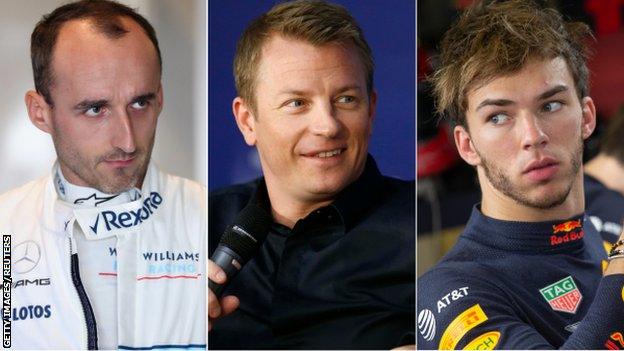
Kubica back in F1, Gasly promoted to Red Bull and Kimi cracking a smile for 2019 - it's already unpredictable
Every Formula 1 season has themes - storylines that define the year.
Some of these come as a surprise. Who could have predicted that 2018's championship would turn on so many errors from Sebastian Vettel and Ferrari, for example?
Others are more predictable. Every team heading into this year has a series of questions hanging over them that will form part of the narrative of the season, reflective of their immediate history, of expectations and necessities - and the same goes for their drivers.
As the clock ticks down to the launches of the new cars and the start of pre-season testing in mid-February, let's look at the context within which every F1 team is heading into 2019.
Mercedes
F1 Breakdown: 'Hamilton just has the best car, doesn't he?'
Drivers: For Lewis Hamilton, nothing else will do this year but a sixth world title. The question for Hamilton is: how does he find it in himself to top last season? Undoubtedly his greatest yet.
A virtually flawless 2018, including a number of thrilling, inspirational drives, will not be easy to top. But Hamilton headed into the winter saying he was going to work on trying to do exactly that, and he says he is "ready to fight" again.
For his team-mate Valtteri Bottas, this could also be a defining season.
The Finn ended last year winless, even if he was unlucky not to take at least two victories, and he has only a one-year deal for 2019. With Esteban Ocon in the wings as reserve driver, and team boss Toto Wolff pledging to find the Frenchman a drive for 2020, the pressure is on Bottas to perform.
Team: Mercedes won a fifth consecutive drivers' and constructors' championship double last year and this year are aiming to break the all-time record set by Ferrari in the Michael Schumacher era.
But last year they were able to achieve their feat only because of Ferrari's implosion - Vettel could have won the title had he had as flawless a season as Hamilton.
Ferrari have made steady progress in recent years. In 2017, they were faster for much of the first half of the year, only to be steamrollered when Mercedes kicked on after the summer break. In 2018, Ferrari stepped up again - faster than Mercedes more often than it was the other way around.
If that trend continues, Mercedes could have their work cut out. So the pressure is on the world champions to make a significant step forward with their new car this year.
Ferrari
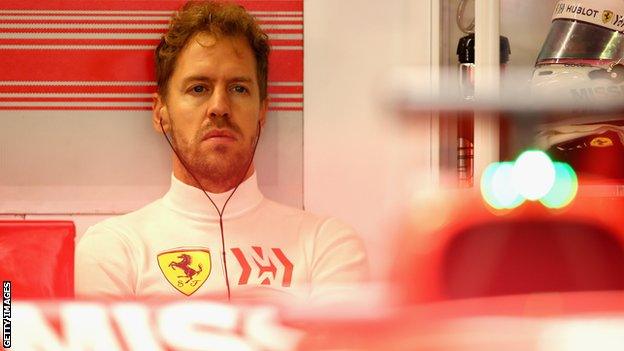
Vettel won five grands prix last season but failed to top the podium in the final eight races
Drivers: Big changes this year, with the arrival of Charles Leclerc to replace Kimi Raikkonen and a new team boss following the ousting of Maurizio Arrivabene.
But in many ways the spotlight is on the man who is supposed to lead the team on track - Vettel.
It sounds odd to say it of a four-time world champion with 52 wins, but the German is arguably fighting for his reputation. He crumbled in the fight with Hamilton last year. And in Leclerc he faces the threat of a talented rising star, much as he did with Daniel Ricciardo at Red Bull in 2014, when Vettel lost in no uncertain terms.
If Vettel is beaten by Leclerc on a regular basis this year and, assuming Ferrari have a competitive car, again falls short of the title, what will that mean for his future, with only a year left on his Ferrari contract after this season?
Leclerc has different pressure, of his first season in a top team, and the most famous one of all to boot.
Expectations are high, so good did he look in his debut year last season. He says he expects to win races and challenge for the title if the car is good enough. Whether he lives up to those ambitions or not, the internal dynamics at Ferrari will be fascinating.
Team: Ferrari arguably produced the best car last year and lost the title only because of errors, largely by Vettel, but also from the team.
With former technical director Mattia Binotto in Arrivabene's place, the first question is whether Binotto can maintain the team's forward technical progress while being in overall charge.
Beyond that, can he provide a more stable environment and wiser race-team operational management, both of which were beyond Arrivabene?
If he can, Ferrari could be formidable indeed - but how will they manage the relationship between the drivers?
Red Bull
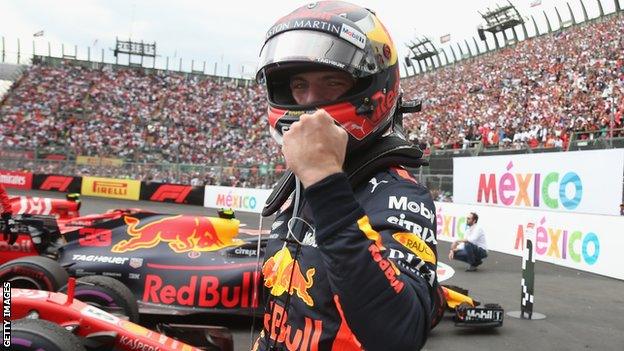
Austria and Mexico were races to celebrate for Verstappen. Brazil's 'push-gate' however, was not
Drivers: With Daniel Ricciardo gone, Max Verstappen effectively formally takes on the role of team leader he had carved for himself by the force of his consistently superlative performances last year - once he stopped crashing in the first six races.
But that does not necessarily mean the Dutchman will have it all his own way.
Frenchman Pierre Gasly is Verstappen's new team-mate, and he looked very handy indeed with some of his starring performances in his debut season at Toro Rosso, most notably his brilliant fourth place in Bahrain.
Verstappen and Ricciardo rubbed along pretty well for most of their three years together, despite a handful of on-track incidents.
Gasly is a friendly but forceful character and while Ricciardo was already established as a winner by the time Verstappen joined him at the team, Gasly is out to carve a reputation.
It is not hard to see tension developing between the Red Bull drivers if they are evenly matched. And Red Bull have not always handled such situations well - remember Vettel and Mark Webber?
Team: All eyes on the Honda engine this year. Red Bull have great hopes of their new partnership, believing it will help them close the gap to Mercedes and Ferrari. But even they don't believe it is realistic to expect Honda to improve enough in 2019 to close the gap to the best engines.
Can they make enough progress to enable Red Bull's chassis to do the rest and make it a three-way fight at the front?
And if progress is less than expected, will Red Bull, fresh from a fractious relationship with Renault caused by their consistent public criticisms, be able to keep their mouths in check?
Renault
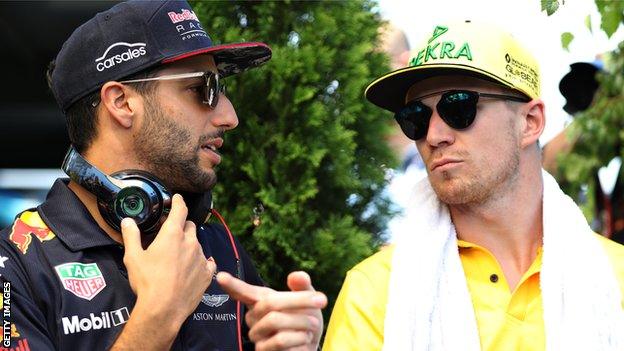
Who will claim top spot at Renault in 2019 - Hulkenberg or new boy Ricciardo?
Drivers: Daniel Ricciardo joins the factory Renault team amid a fanfare following his surprise decision to leave Red Bull.
Renault hope that the recruitment of the Australian seven-time winner can help them move to another level as they seek to close on the big three.
But first of all Ricciardo has to establish himself as team leader, which will not necessarily be an easy task with Nico Hulkenberg as his team-mate.
The German is highly rated by Fernando Alonso, among others, and is unlikely to be a pushover. Not least because Ricciardo's arrival offers Hulkenberg a golden opportunity to prove he deserves to be classed among the elite, a ranking that has escaped him so far in a career that remarkably does not even include a podium finish.
Team: When Renault returned as a constructor in 2016, their target was to be winning races within five years. Last season, though, progress slowed, and they will be under pressure to close on the top teams in 2019.
This means improving both car - which was at least a second off the similarly powered Red Bull last year - and engine, where Renault were in danger of falling to fourth out of four in the pecking order by the end of last season.
Insiders say progress has been made on the engine, but that Renault's realistic hope is to halve the gap between their power-unit and those of Mercedes and Ferrari.
That would be something - but it's still not enough for a team whose pretensions of being title contenders by 2021 are in danger of collapsing.
Haas
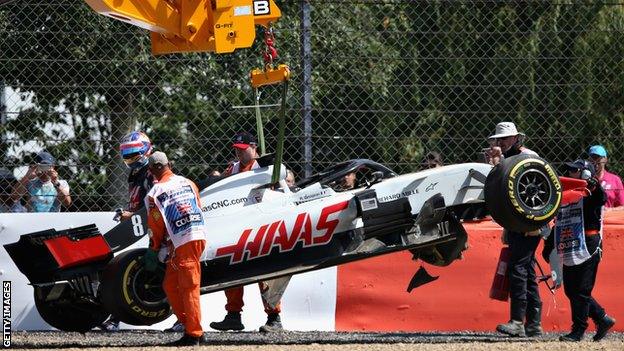
The sight of Grosjean's Haas being winched onto a recovery truck is hopefully a thing of the past
Drivers: A third season together for Romain Grosjean and Kevin Magnussen, both of whom have challenges ahead.
Grosjean came very close to his career going down the toilet after a series of errors in the first half of last year, only to rescue himself with some starring performances later on. Can the Franco-Swiss ever find a way to access his best stuff - which is of a very high quality - on a more consistent basis?
Magnussen was overall the more convincing and consistent, but although he produced some very strong performances last year, the impression is that when Grosjean gets it all hooked up, the Dane can't quite live with him.
Team: Last year was the best yet for this small team that continues to cause resentment from rivals through the closeness of their relationship with Ferrari.
Haas say other teams could follow suit, in buying everything but aerodynamic surfaces and chassis from a bigger team, but the likes of Williams and McLaren say that's missing the point; F1 is not meant to be like that. That debate is not going away any time soon.
With the caveats that situation creates, Haas have done an impressive job so far in F1. But they could have done better in 2018 and they know it.
Their fundamental aim for 2019 is to maintain their competitive position - often best of the rest on pace last season - and cut out the inconsistency and mistakes to deliver their potential more often.
McLaren
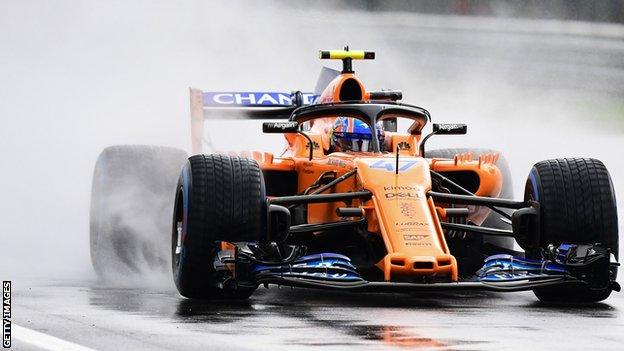
Lando Norris has already had a taste of life in the McLaren after taking part in various practice sessions in 2018
Drivers: Two-time world champion Alonso has gone. And without him… what? The shadow of the brilliant Spaniard will hang heavy over McLaren in 2018, as they start what they hope will be the first season of a rebuilding programme that will return them to competitiveness by midway through the next decade.
Alonso has been replaced by Carlos Sainz. He is a driver of considerable pace and potential but who has had a tendency to be a bit up and down so far in his career. And alongside him is British rookie Lando Norris, whose clearly abundant talent has created great expectations.
The battle between the two of them is highly anticipated but a lot depends on the car.
Team: McLaren might have spent 2013-17 in denial about how far they had fallen, but once it became clear last year, they have certainly not hesitated in doing something about it.
Three senior figures are out, four new ones have been appointed - although new technical director James Key and new F1 managing director Andreas Seidl do not yet have start dates.
At the start of a rebuilding process, the key this year is to show evidence they have improved. Last year, they had the second-worst car for much of the season and only Alonso's genius saved their blushes and secured a higher-than-deserved championship position.
People both inside and outside McLaren will be looking for signs of progress from the lowest ebb in their once-illustrious history.
Racing Point
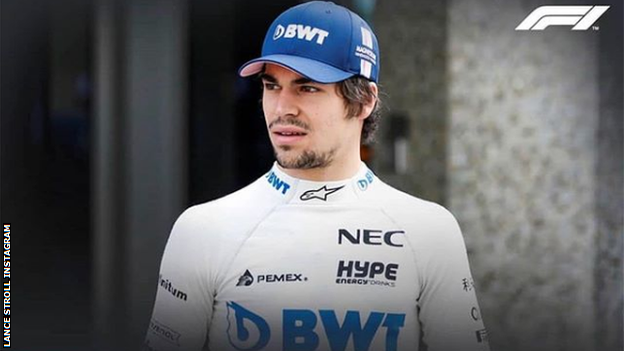
Stroll wrote on Instagram: "This is the beginning of an incredibly exciting journey in my Formula 1 career. I am excited to embrace this new opportunity"
Drivers: Lance Stroll's switch from Williams to the former Force India team, which is now owned by his father, the Canadian billionaire Lawrence Stroll, sets up one of the most interesting dynamics of the new season.
Stroll Sr is very ambitious for his son, and ran into friction at Williams on occasions as a result. One example being when he demanded a new front wing was taken off Sergey Sirotkin's car in Hungary last year and given to Lance when Stroll had damaged his. The team refused, which led to a sizeable argument.
Now Stroll owns a team, he can do what he likes if any such similar situation arises.
Stroll Jr was outpaced by Felipe Massa in his debut season at Williams, and was out-qualified more often than not by rookie Sirotkin last year. How will he compare with Sergio Perez, an established and formidable driver, whose quality is known?
If Perez is consistently quicker, how will Stroll Sr react? And if there is any attempt to favour the family connection, what will be the response from Perez - a determined character not afraid to speak his mind?
These are fascinating questions heading into the team's first full season in its new guise.
Team: Had it not been for their mid-season points reset after financial collapse, Force India would have finished fourth for the third consecutive season last year.
Now under new ownership and better funded than for some time - perhaps ever - the team have ambitions of moving up the grid.
That's not going to happen overnight, but it will be worth watching what happens now the grid's best pound-for-pound team is finally married to decent resources.
Having said that, rich as Stroll is, his bank balance is no match for those of the massive global corporations his team would have to beat to move forward. So the challenge could be keeping expectations grounded in reality.
Alfa Romeo Racing
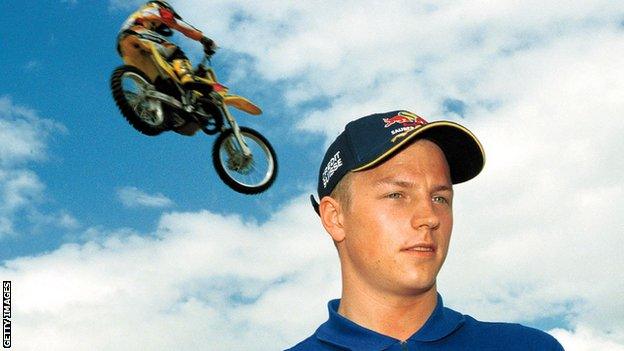
In 2001, a young man named Kimi Raikkonen prepared for his first Formula 1 race for Sauber in Australia. If Kimi could recreate this pose in Melbourne in March...
Drivers: All change, with veteran Kimi Raikkonen, 40 this year, rejoining the team where his F1 career started, although they have just changed their name from Sauber to Alfa Romeo Racing.
Alfa Romeo were Sauber's title sponsor in 2018.
Partnered by Italian Ferrari protege Antonio Giovinazzi, Raikkonen will do the usual - consistent, reliable performances without setting the world on fire.
The pressure is all on Giovinazzi, who looked set for a stellar career when he chased Gasly all the way to the Formula 2 title in 2016, despite being in his rookie year, but who developed a reputation for crashing in a handful of appearances for Sauber in 2017.
Team: Sauber made giant strides in 2018, starting the season as the slowest team, ending it competing for best of the rest.
The team benefited from decent resources for the first time in years, but it's also true that most of the impressive performances came from Leclerc.
Can the team keep up the momentum now the Monegasque has left for Ferrari?
Toro Rosso
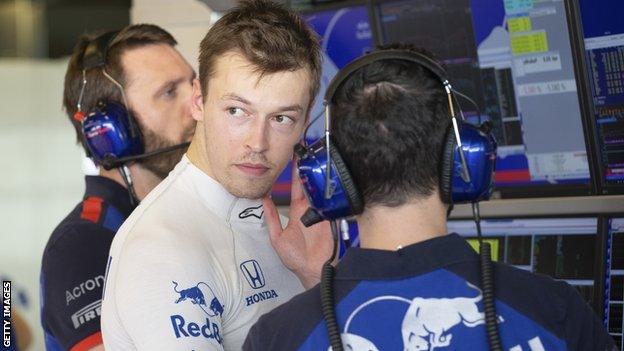
Kvyat said he "never gave up hope" of racing again despite being dropped twice by Red Bull
Drivers: Russian Daniil Kvyat returns for a second chance at F1. He has been re-employed just over a year after being dumped by Red Bull, largely because their conveyor belt of young talent had a hole in it.
Quick but inconsistent, Kvyat will be a decent yardstick for promising rookie Alexander Albon, who was born in Britain but races under a Thai passport, and is highly rated.
Team: Toro Rosso lost technical director James Key at a crucial time last summer when he was poached by McLaren.
In theory that might hurt them. In practice, they are quietly confident and are aiming for fifth place in the championship. But they always say that.
As the second Red Bull team in a year when the factory outfit takes on Honda engines, they are likely to continue the role of guinea pigs they fulfilled as the Japanese company tested developments last year.
Williams
Archive: Kubica's remarkable return to Formula 1
Drivers: One of the most tantalising partnerships of the season pitches Robert Kubica, returning after an eight-year absence following his life-changing rally crash in 2011, against British rookie George Russell.
Kubica's comeback is a real feel-good story - the Pole, after a brutal rehabilitation period, finally getting a chance to continue a career that had looked destined for the very top. But questions remains as to the level at which he will he perform, with only partial use of his right arm.
Russell, a Mercedes young driver, is one of the most promising youngsters in years.
In the perceptions game, how will it play? If Kubica beats Russell, will Russell's reputation be damaged or will people think Kubica has returned close to or at his previous level? If Russell beats Kubica, will it be seen as inevitable, given the Pole's "limitations", as he describes his physical issues, or a great achievement? The same questions apply if they are closely matched.
Team: Williams hit rock bottom in 2018, finishing last in the constructors' championship. The car wasn't great, to say the least, but an uninspiring driver line-up hardly helped.
They hope to have addressed the driver issue, but what of the car? Unlike McLaren, there have been no obvious major changes in the team - other than the departure of performance director Rob Smedley, who is likely to pop up elsewhere by summer time.
Williams really need to show signs of progress, if they are to allay concerns about their future.